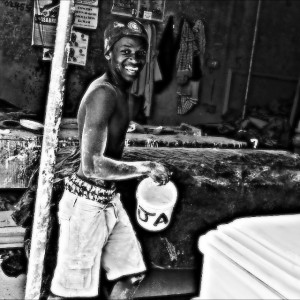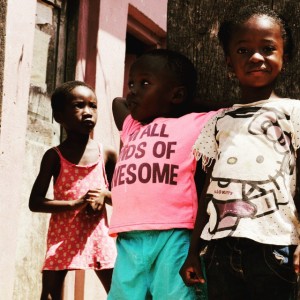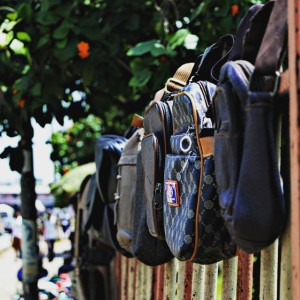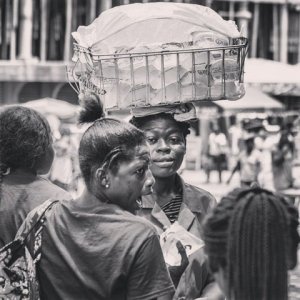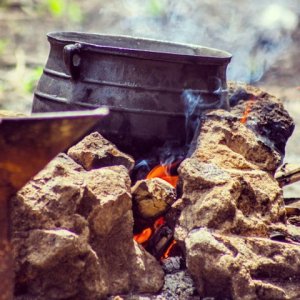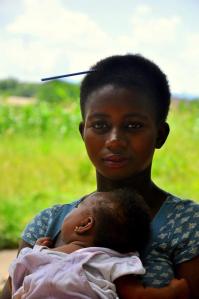The stream crosses the path
The path crosses the stream
Which comes first?
Pure, pure Tano, the magnificent river that floods in harmattan
It felt like it was his eulogy whenever the griot stood to sing. It has been four years already. Four years. And sitting under the Tree of God has become a familiar funeral ground. There was no familiarity on the skins of his relatives. It seemed surreal. They held hope like a grain of corn. Sometimes, it slipped through their fingers. They reluctantly said that death was taking too long a time to come for him.
The sun rose and touched the tip of the hills that surrounded Tanoso. It poured through the everyday lives of the people and it was just a reminder that life had begun. Mornings were call to prayer. Adults were seen on farm trails; their children followed them. Those of school-going age scuttled, like red ants on their way to school. At the center of the town where the community center stood, four men were playing draught. Others stood by them, arguing about the news they heard on radio the previous night. Their voices clung to the air around them. The palm wine seller was opening up her drinking bar. Tanoso was waking up to the hustle and bustle that it knew. On the horizon, smoke erupted from households in a similar fashion as cigarette smoke rises in between fingers, forming a carpet that almost mimicked the clouds. That blue-white skyline.
The town was a beauty. It enchanted like the firm breasts of a virgin. Rightly so, it had been fought over by men, warriors. Tanoso was originally occupied by the Guans until the Akans came. The Akans won the numerous wars that were fought and so, ruled the town.
When the branches of the Tree of God filtered the sun rays, the remnant rays lighted a body that was a far cry from what it was four years ago. Its muscles had atrophied. Bones erupted from the body like mounds on farmlands. From afar, you could literally count the rib bones from the sides. His sharp cheekbone stood in isolation. Occasionally, he moved a finger and then, returned to his coma-like state. His wife would mourn him like he was dead. The griots would sing. People would walk in and pay their respects. Okomfo Agyebi has been lying under the Tree of God ever since he went into the spirit.
Tigare the oracle reached Akanland in the 1900s from Guans of the south. Nana Oparebea, supreme priest of the Great Guan god of Larteh, Akonnedi Abena had widely traveled to Northern Ghana in the late 1880s. When she got to Yipala, she heard about Tigare of hunters who assisted in locating and catching game. He was said to be wonderful and popular. He was fun, sang beautiful songs and danced. He revealed himself through wood. He came from an Islamized region and so, he carried prayer beads and wore traditional smock. Nana Oparebea brought him with her to Larteh. Once in the south, native Guans of Tanoso brought him to the Tano river god. There, at Tanoso, Tigare found home among the class of deities.
Tanoso derived her popularity from the Tano deity. He was very popular in southern Ghana. He was said to be the second son of the Supreme Being. He was kind. To avoid clashes between Guans and Akans, he decreed that oracles from both gates should be accommodated in his shrine. That was how Tanoso knew peace for so many years.
Every year, people from all over Ghana, Togo, Benin and Ivory Coast flooded Tanoso with requests. Predominately among them were barren women. Tano had a special eye for planting seeds into the wombs of women who died for his help. Through out these countries, people named their children Tano in appreciation of his help.
Agyebi grew up in Tano’s court. His father was the chief priest. At a tender age, he grew fond of his father. He was his consort, of sorts, for he was a lonely man. The man lost his wife when she was conceiving Agyebi and had refused to re-marry. He laid his life, all of it on Tano. Like a door mat in front of a room. He had faith. Some people said it was his faith that killed him. But before he went to the village to be with the ancestors, he made Agyebi promise him that he would graduate from the university before he assumed the role of priesthood of Tano. So, Agyebi did attend university where he first met his wife, Ernestina who would become a lawyer.
After years of studies, whilst his mates were going for their national service duties, he returned to his holy hometown of Tanoso. All God’s children, after all, come home to Him. He came with him an innovative mind of getting Tano onto the internet. He did consultation over the internet. He opened Facebook Fan page for Tano. He had website for Tano. He consulted with other Akan and Guan priests in the diaspora via Skype. He did webinars. That was before his fall. Or something like that.
For four years, Fofie, the annual festival for Tano has not been held. His priest lay tattered, rickety under the Tree of God where life springs from. Owl the harbinger of death was hovering around The Tree of God in the afternoon, there in the broad day light. The griots knew what it meant. They chorused –
Man is a wanderer
Dear Owl, do not take his soul
Remember Tano feeds you
Do not bite that hand
They went on and on until a black cat ran across them and settled behind Tano’s shrine. The owl circled three times, dissolved in the dark clouds and after awhile, it cleared up. Agyebi’s soul was safely at home.
Agyebi had a favourite priest trainee. Yaw. He came from Nzemaland. His forefathers had been keepers of the Kankam Nyame cult. He stood with a pleasantly soft, rounded body and had a nose that you would think was falling off. He always wore a smile, the kind that reminded Agyebi of his younger self. Agyebi called him son. He was his son. He loved him like his own.
Everywhere that Agyebi went, Yaw lurked around. They were cattle and the cattle eaglet. Agyebi taught him everything he knew about Tano. They both loved Tigare in equal measure. In the night, when everyone was asleep, their voices rang in the stale air and pierced exhausted ears. They had a good time until the day the Yaw disappeared from Tano’s court with one of Tigare’s wood. He had abandoned his priesthood training without warning anyone.
Now on his own, Yaw used Tigare and Kankam Nyame to help sakawa boys. Modernity had made internet scam such a high skilled practice. It did not only require a sweet tongue but also, a hand from those higher than lesser mortals. Yaw would tell them to carry coffins wrapped with white cotton cloth in the night. They would walk through market places and leave the coffins wherever they liked. The first person to see them in the morning died. Armed with the soul of the deceased, Yaw would make oracles and give them to the practitioners of sakawa. With their new confidence, they, too, would send thousands of emails in search of prospective clients. They would cyber-sex Indian men whose tummies burdened them. They would comfort American widows. On dating sites, they used their friends, girlfriends and sisters’ pictures as their profile pictures to bait desperate lovers. The more tech geeks relied on Yaw to locate hard disks that they could recover credit card numbers and contract details that they could use for blackmailing. In that worldview, it was not called stealing. It was restitution. It was restitution for Atlantic slave trade. It was restitution for colonization. It was restitution for everything wrong with African history. It was about survival. With their oracles hanging on walls like family portraits and staring at their computer screens, dollars and pounds descended into a seemingly bottomless pit of bank accounts that ended in Kumasi.
Agyebi developed a fluid ear for Tano as he snaked through Tanoso. There was something particularly surreal about the whistles that he heard. He loved the stars. By Tano, he sat and watched them every night. Every night, he saw gloomy stars. He saw spirits of the dead. They inhabited trees and hills of Tanoso. They cried. They could not cross the sea to the other life.
Yaw had taken their lives prematurely. They had not prepared for death. They did not have money to pay the boatman who will ferry them to the other world. They needed somebody to bring them money.
Those spirits tormented Agyebi. He could not sleep. He saw them when he went to fetch water. He saw them in his soup. Besides, he was living years with regret and questioning himself for letting Yaw in on many family secrets relating to Tano. Agyebi on a day that was too dull to encourage proper thinking decided that he would enter the spirit. He called his griots and told them. He said his voyage would take forty days. He gathered bow and arrow, gun powder, gun, bodua and one of Tigare’s masks. He took his wife in his arms and playfully bit her left ear before lying on the mat under the Tree of God. Her face collapsed into a rotten smile and spoke a language that was heavier than silence. She wrapped her arms around her upper body and buried herself in a sea of tears. They sang and played drums. He felt himself resting lightly on his physical body. He was in space; in that field that nothing can be restricted. He was there with no organ but fully, he was a being. He kept defying gravity until he came to the level of the branches of the Tree of God. At this point, he entered the other world. The pot that had been gathering rain water for centuries in the fingers of the Tree of God fell and broke into pieces. Gradually, the choruses of the griots were fading, hiding in the darkness of nights as they came and went.
